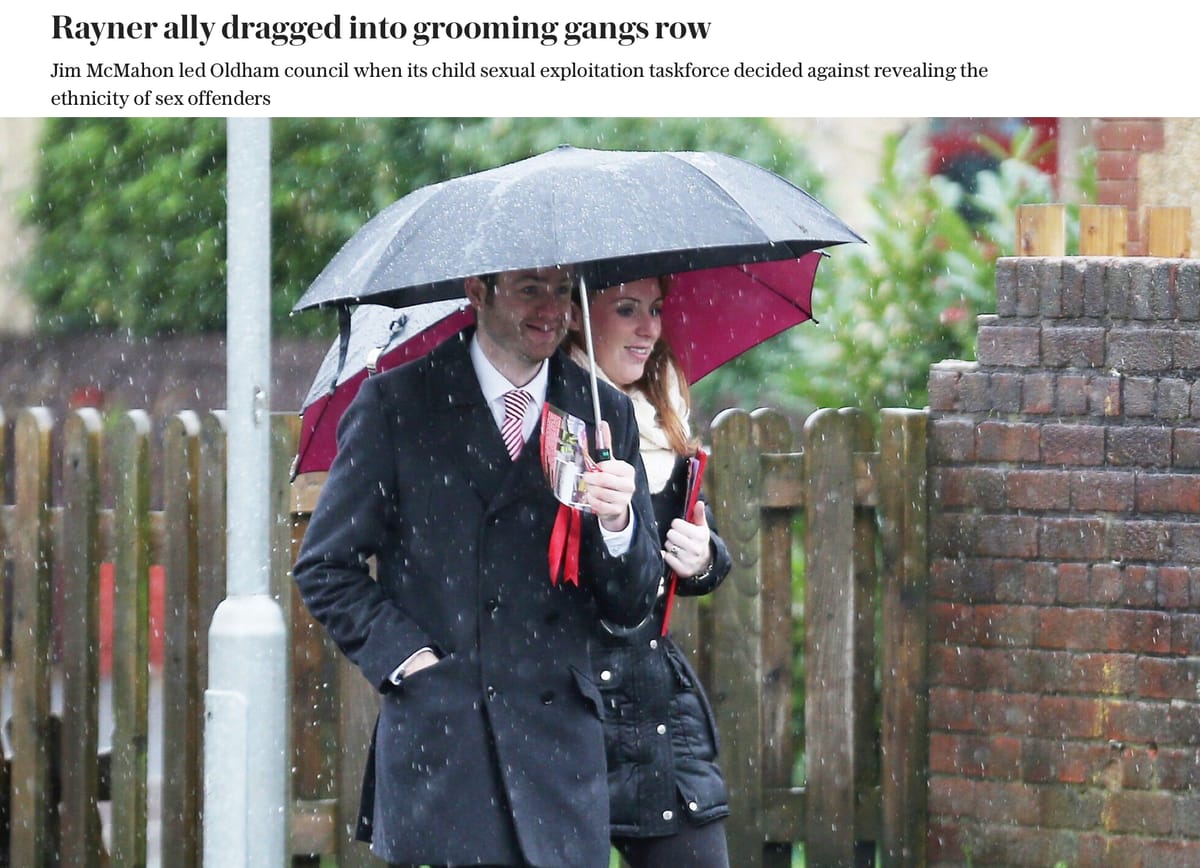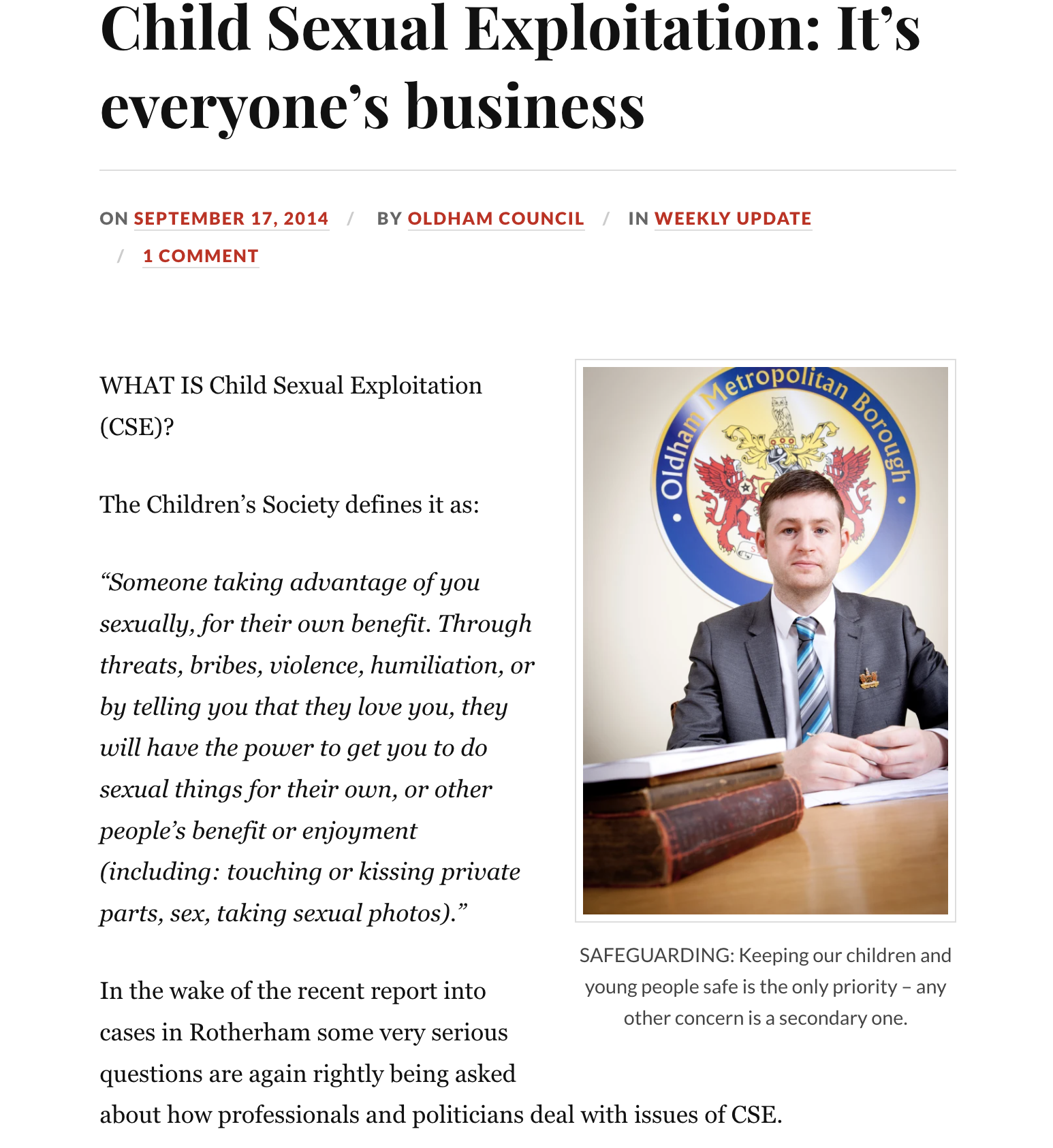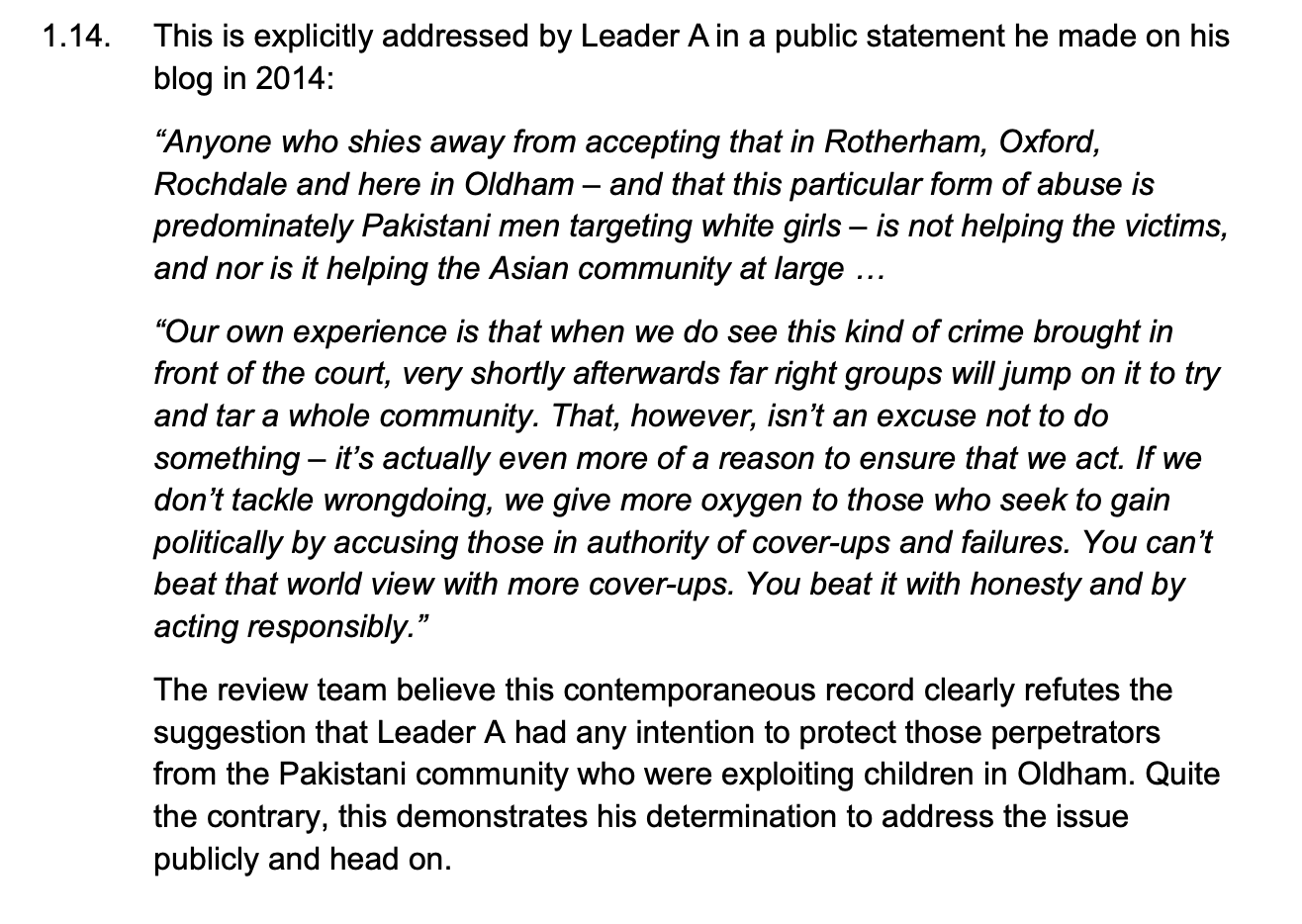Turning Jim McMahon's Cowardice Into Courage

How Andy Burnham's Assurance Review Rewrote History
Andy Burnham's rigged review weaponises a single blog post to whitewash years of institutional betrayal
Let me tell you what political cowardice looks like in 2025.
It looks like a team of handpicked reviewers pointing to a blog post from 2014 and calling it "leadership." It looks like defenders of Jim McMahon (the man who led Oldham Council while children were being dragged off the streets and gang raped) treating his belated acknowledgement of grooming gangs as some kind of profile in courage.
It looks like everything that's rotten in our political system: the confusion of words with action, the celebration of arriving late to your own crisis, and the weaponisation of extremism fears to silence legitimate demands for justice.
But here's what really sickens me: while McMahon's defenders celebrate his blog post from 2014, the children who were being abused in Oldham from 2011 onwards got nothing. No protection. No justice. No leadership. Just years of silence from the man elected to keep them safe.
Those children (working class kids from families who trusted the system to protect them) were abandoned by every institution meant to safeguard them. And now we're supposed to applaud the man who presided over that abandonment because he eventually wrote about it on the internet.
This is how institutional betrayal gets rebranded as moral courage. This is how political failure gets turned into leadership legacy. This is how the system protects itself while throwing the victims under the bus again.
Three Years Too Late: McMahon's Damage Control Masquerade
Here's the timeline they don't want you to focus on.
Jim McMahon became Leader of Oldham Council in 2011. By that time, grooming gang patterns were already emerging across Greater Manchester. The signs were there, the warnings were being issued, and anyone paying attention knew what was coming.
Rochdale exploded in 2012 with Operation Span. Nine men convicted of running a ring that abused girls as young as 13. The trial revealed years of institutional failure, police indifference, and social services negligence. It was a blueprint of what was happening across the North West.
Oxford followed in 2013. Seven men convicted of running a network that abused vulnerable girls over several years. Again, the same pattern: authorities failing to act, victims dismissed and ignored, communities left to face the horror alone.
Rotherham's bombshell report landed in August 2014, revealing 1,400 children abused over 16 years while councillors, police, and social workers turned blind eyes. The Jay Report became a watershed moment. No politician could claim ignorance anymore.
And when did McMahon finally acknowledge what was happening on his own patch? August 2014. In a blog post. The same month the Rotherham report shattered any remaining illusions about the scale of institutional failure.
Not in 2011 when he took office and had the chance to get ahead of the crisis. Not in 2012 when Rochdale's horror was splashed across every newspaper. Not even in 2013 when the pattern was undeniable. But in 2014, when staying silent would have marked him as either criminally negligent or wilfully blind.
The Assurance Review wants us to see this timing as evidence of moral courage. I see it as damage limitation from a politician who finally realised the game was up and needed to get his excuses on record before the spotlight turned to Oldham.
This wasn't leadership. It was the political equivalent of putting on a seatbelt after you've crashed through the windscreen.
Blog Posts Don't Save Children: The Pathetic Theatre of Inaction

You want to know what real leadership looks like when children are being raped by organised networks?
It looks like emergency council meetings called within days of the first credible allegations. It looks like independent reviews launched immediately, not years later. It looks like police operations properly resourced and directed to prioritise child protection over community relations. It looks like heads rolling in social services when safeguarding failures become apparent.
It looks like support systems built for survivors before they have to fight for recognition. It looks like whistleblower protection for those brave enough to speak out. It looks like transparency about what went wrong and accountability for those who let it happen.
It looks like a leader who stands up in public (not on a blog that three people might read) and says: "This is happening in our town, we failed these children, and here's exactly what we're doing to fix it."
What it doesn't look like is a blog post acknowledging the problem exists, published three years into your leadership and only after everyone already knows the score.
McMahon's 2014 post said Pakistani men targeting white girls was a specific issue. He condemned "cover ups" as fuel for extremism. Fine words that cost him nothing and committed him to less.
But what concrete action followed from the man who actually had the power to act? What safeguarding revolution did this moment of clarity trigger? What accountability measures were implemented for the institutions under his direct control?
The Assurance Review can't point to any because if there had been real action, they wouldn't need to rely on a blog post as their star witness. They'd have a record of achievement to defend, not damage limitation exercises to explain away.
This is the disease eating our political class alive: they think communication is governance, that statements are solutions, that being seen to care is the same as actually caring. When industrial scale child abuse demands concrete action, offering a blog post isn't leadership. It's an insult to every child who needed protection and got performance instead.
McMahon didn't fail because he was afraid of being called racist. He failed because he prioritised his political comfort over children's safety. The blog post proves it: reactive, calculated, and utterly hollow.
The Coward's Playbook: Hiding Behind Far Right Fears
Now let's talk about the most revealing part of McMahon's blog post, the bit that tells you everything about his priorities.
He warned that failing to act would "give more oxygen to those who seek to gain politically by accusing those in authority of cover ups."
Read that again. The primary concern isn't the children being destroyed. It's the political threat to "those in authority" (people like him).
This is how institutional failure perpetuates itself. The victims become secondary to the reputational risks faced by their supposed protectors. Justice becomes less important than preventing the "wrong people" from gaining political advantage.
It's the far right fig leaf: the idea that legitimate demands for accountability are somehow dangerous extremism. It's how politicians like McMahon position themselves as the reasonable centre ground while doing absolutely nothing to solve the problems they acknowledge exist.
The children of Oldham deserved better than a leader whose greatest fear wasn't their suffering, but his own political exposure.
This language reveals the true motivation behind such interventions: not justice, but political self preservation. The far right isn't mentioned because it threatens children, but because it threatens politicians. It's a classic misdirection: positioning legitimate demands for accountability as dangerous extremism.
The Fix Was In: How Burnham's Lackeys Rigged The Review
Here's what makes the Assurance Review's defence of McMahon so damning: they genuinely think a reactive blog post represents meaningful political action. But more than that, they've systematically excluded evidence that would contradict their predetermined conclusions.

They've isolated one statement, stripped it of context, ignored the timeline, and presented it as definitive proof of McMahon's "determination." But look at what they deliberately left out of their terms of reference:
Schools were excluded, despite well documented accounts of abuse occurring at school gates and predators operating around educational institutions. Why? Because investigating schools might have revealed uncomfortable truths about how these networks operated with institutional knowledge and complicity.
They relied heavily on statements from the very institutions accused of enabling abuse (councils, police, social services) while excluding or marginalising testimony from survivors, whistleblowers, and community members who lived through the reality these institutions helped create.
They focused on "process" rather than outcomes, celebrating the existence of policies rather than examining whether those policies actually protected children. It's bureaucratic box ticking masquerading as accountability.
Most tellingly, Burnham's experts treated McMahon's 2014 blog post as some kind of primary source evidence of leadership, while ignoring the three years of silence that preceded it and the limited concrete action that followed it.
This isn't incompetence. It's complicity. The review's methodology wasn't flawed. It was designed to reach predetermined conclusions. They weren't seeking truth; they were providing political cover.
The review's authors aren't neutral observers. They're political actors serving specific interests. They're part of the same establishment that failed these children in the first place: the same network that prioritises political reputation over child protection, that mistakes PR for policy, that confuses damage limitation with justice.
They know exactly what they're doing. They're rewriting history to protect the people who presided over institutional failure, using the language of accountability to provide the opposite. It's sophisticated, calculated, and utterly corrupt.
Burnham commissioned this review knowing exactly what conclusions it would reach. The authors delivered exactly what was expected of them. The victims get betrayed again, the politicians get their reputational whitewash, and the system carries on exactly as before.
Normalising Betrayal: Why We're Setting Up The Next Generation of Victims
When we celebrate politicians for blog posts written years after the crisis began, we're not just lowering standards. We're abandoning them entirely.
When we treat belated acknowledgement as bold leadership, we're telling future politicians that doing the bare minimum, years late, is enough to earn historical vindication.
When we allow reviews like this to rewrite history, we're ensuring that the next generation of victims will be failed by the same institutions, protected by the same excuses, betrayed by the same political class.
The children who were abused in Oldham while Jim McMahon led the council deserved a leader who acted swiftly, decisively, and fearlessly. Instead, they got a politician who blogged thoughtfully, eventually, and carefully.
The Assurance Review asks us to celebrate this distinction. The rest of us should be asking why we accept leaders whose greatest achievement is acknowledging (in writing, after everyone already knew) problems they were elected to solve.
The National Inquiry Must Investigate The Cover Up of The Cover Up
Here's what needs to happen now.
The Government's national inquiry into grooming gangs must extend its remit beyond the original failures. It must investigate the systematic attempts to cover up those cover ups through rigged reviews, predetermined conclusions, and institutional whitewashing.
The Assurance Review isn't just incompetent. It's evidence of ongoing corruption. It shows how the same political networks that failed children continue to protect themselves through manufactured vindication and historical revisionism.
The inquiry must examine how Andy Burnham commissioned this review, who selected its authors, how its terms of reference were designed to exclude inconvenient evidence, and why survivors' voices were systematically marginalised in favour of institutional self justification.
It must investigate the methodology that turned a single blog post into evidence of leadership, that treated belated damage control as proactive action, that ignored three years of silence to celebrate eventual acknowledgement.
Most importantly, it must examine the wider pattern of how reviews like this are used across the political system to provide cover for institutional failure. The grooming gang scandal didn't end with the original abuse. It continues through every rigged review, every predetermined conclusion, every attempt to turn political failure into historical vindication.
The children of Oldham deserve more than having their betrayal rebranded as their protectors' triumph. The survivors of institutional failure deserve more than seeing their abusers' enablers celebrated as their champions.
The national inquiry has the power to expose not just the original crimes, but the ongoing corruption that seeks to bury them. It must use that power.
Enough: Stop Celebrating Political Cowardice
This isn't about political point scoring or partisan advantage. This is about what we're willing to accept from the people we trust with power over our communities and our children.
If a blog post written three years into office, years after the crisis began, is the strongest defence of Jim McMahon's record on grooming gangs, then that defence is an indictment that proves the prosecution's case.
If that's the standard we're setting for political leadership on child protection, then we've already surrendered to the next wave of institutional failure. We're telling future politicians that doing the bare minimum, years late, is enough to earn historical vindication and political protection.
When we allow reviews like this to rewrite history, we're ensuring that the next generation of victims will be failed by the same institutions, protected by the same excuses, betrayed by the same political class that failed the children of Rotherham, Rochdale, Telford, and Oldham.
The children who were abused in Oldham while Jim McMahon led the council deserved a leader who acted swiftly, decisively, and fearlessly when the first warnings emerged. They deserved someone who would have put their safety above political calculations, their protection above reputational management.
Instead, they got a politician who blogged thoughtfully, eventually, and carefully, only after the political cost of silence became too high to bear.
But here's what we need to understand: McMahon wasn't just negligent. He wasn't just incompetent. He wasn't just politically calculating.
For three years, while children were being systematically abused in his borough, he said nothing. He did nothing. He allowed the networks to operate, the institutions to fail, the victims to suffer, all while maintaining the comfortable fiction that addressing the problem wasn't his responsibility.
That silence wasn't passive. It was active participation in a system designed to protect predators and abandon victims. Every day he chose not to act was another day he enabled the abuse to continue.
When McMahon finally spoke in 2014, it wasn't because he'd grown a conscience. It was because he needed political cover. The blog post wasn't leadership. It was damage control designed to protect himself, not the children who'd already been failed.
The Assurance Review asks us to celebrate this distinction, to treat reactive damage control as proactive leadership, to mistake belated acknowledgement for bold action.
But let's call it what it really was: McMahon wasn't just a coward who failed to act. McMahon is more than a coward. He is more than just complicit in the cover up. He was in charge of the council at the time children were being dragged off the streets to be gang raped. Instead of sounding the alarm, he wrote a blog post a few years later.
If you believe Keir Starmer and his Pakistani gangster Islamist courting Labour Party narrative, then once they could no longer dismiss the industrial-scale gang rape of young white girls as a “far-right conspiracy,” we’re told it was fear of being labelled racist that stopped police, public servants, and politicians from protecting those children.
If you believe me, you’ll know the truth is far worse:
They didn’t fail to act because they were afraid. They failed to act because they gained from the silence. They protected the perpetrators because the system rewarded their complicity.
And if you’ve followed my work, you’ll also know they’ve tried, again and again, to silence me. They’ve failed. I’ve exposed the evidence. I’ve laid bare the mechanics of the cover-up.
Now the question is: will enough of you stand with me?
Because if we act together, we stand a real chance of not just of holding every complicit official to account, but of ensuring this never happens again.
If we do nothing, if we simply complain while watching from the sidelines, then this National Inquiry will be nothing more than another whitewash.
But if we join the campaign that forced this inquiry into existence, if enough of us stand up, then politicians will go to prison. This government will fall. And the Labour Party will be finished.
If there’s even a one-in-a-million chance of achieving that, would you not take 10 seconds to stand with me?

By now, most of you know who I am. You know what I’ve done. And you know I’m not here to play a game.
I’m not a Maggie Oliver. I’m not a Tommy Robinson or a Charlie Peters. I’m a political campaigner. Despite attempts to smear me, imprison me, even kill me, I’ve led the political movement that forced this inquiry into existence.
But to take on the full weight of the state and win, we need to scale up. Fast.
We need 10,000 committed people willing to learn the facts, raise awareness, and fight smart in their own communities. Right now, we’re just over 5,000. That 's some going. We need at least 5,000 more.
If you’re not yet subscribed, fix that today. If you are, share this with ten others who care.
🔴 Subscribe – it’s free
If you can afford it, support the work with just 75p/week: £3/month or £30/year.
This is the fight. This is the moment. There will not be another.
🔴 Prefer a one-off contribution?
👉 http://BuyMeACoffee.com/recusantnine
👉 http://paypal.me/RecusantNine
No corporate sponsors. No political party backing. Just you and thousands of ordinary people who know what’s at stake.
Look how far we’ve come already. We are this close. Help finish this.
- Raja Miah MBE